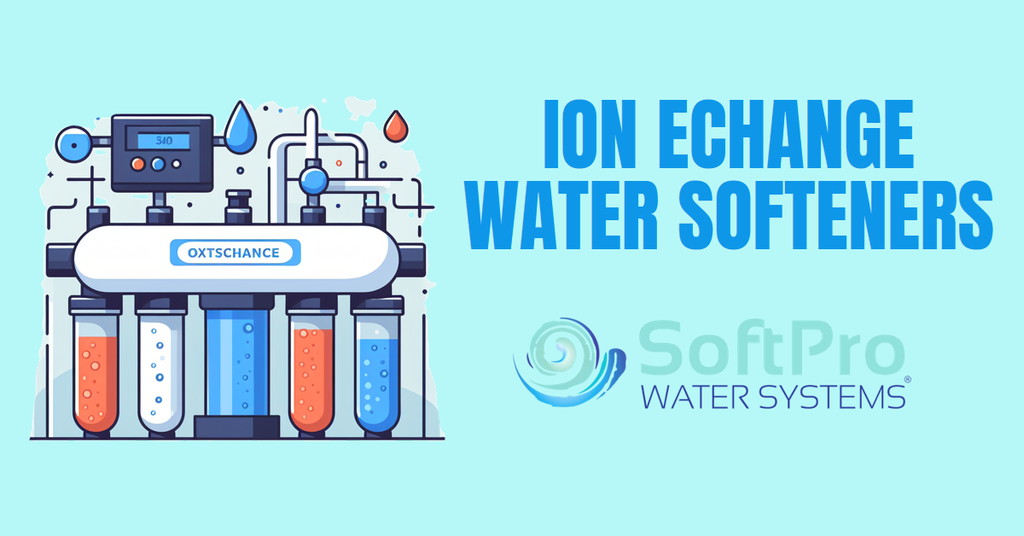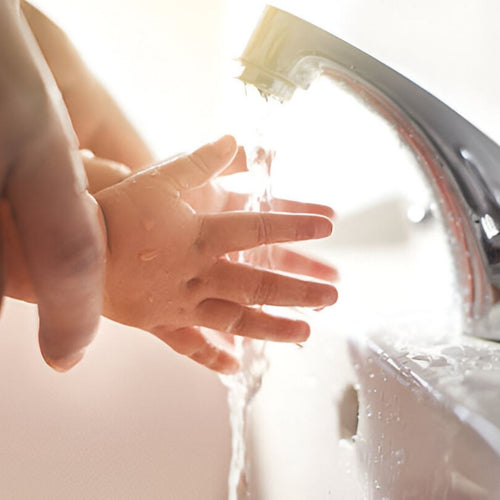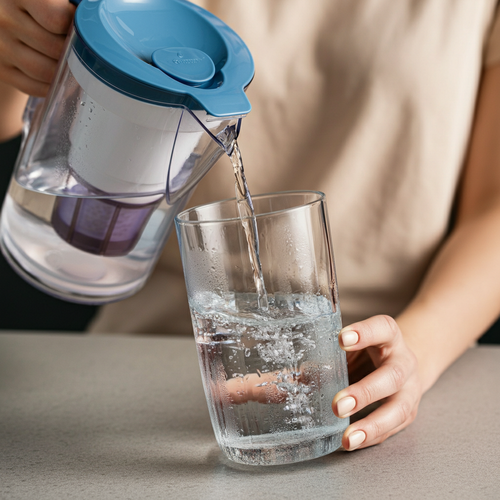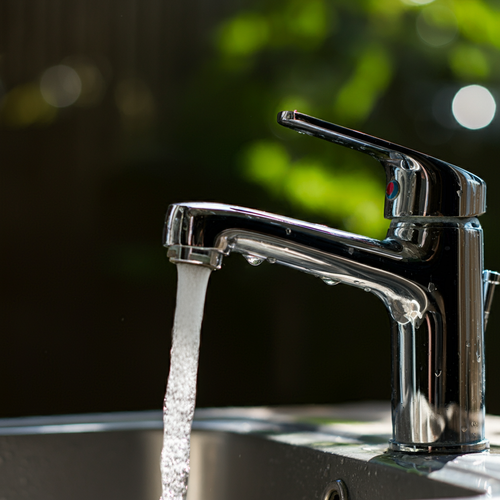What are Ion Exchange Water Softeners?
Ion exchange water softeners are ingenious devices that tackle the widespread problem of hard water. Hard water is riddled with dissolved minerals like calcium and magnesium, which can wreak havoc in your home. These minerals leave behind soap scum and scale buildup, reducing the efficiency of appliances, clogging plumbing fixtures, and even impacting the taste and feel of your water.
But how do these clever water softeners work their magic?
Imagine a microscopic battlefield where tiny resin beads, packed within the softener's tank, stand guard. These beads are coated with sodium ions, ready to engage in a friendly swap. As hard water flows through the tank, the calcium and magnesium ions, eager for a new partner, readily exchange places with the sodium ions on the resin beads. This ion exchange process effectively removes the hardness minerals, leaving behind softened water that's gentle on your appliances, plumbing, and skin.
Here's a quick breakdown of the key benefits of ion exchange water softeners:
- Reduced soap scum and scale buildup: Say goodbye to frustrating cleaning battles! Softened water lathers better, requiring less soap and leaving behind minimal residue.
- Improved appliance lifespan: Hard water buildup can shorten the life of your washing machines, dishwashers, and other water-using appliances. Softened water keeps them running smoothly and efficiently for longer.
- Softer skin and hair: No more feeling like you're stepping out of a chalk bath! Softened water is gentler on your skin and hair, leaving them feeling soft and smooth.
- Potential health benefits: Studies suggest that softened water may reduce the risk of certain skin conditions like eczema and dermatitis.
Ion exchange water softeners are a popular and effective solution for hard water problems, offering a range of benefits that can make a significant difference in your home.
The Hard Water Problem: Understanding the Challenges
Hard water is more than just an inconvenience; it poses a significant challenge to your home's plumbing, appliances, and even your comfort. Let's delve deeper into the challenges it presents and why conquering them might be worth considering.
The Telltale Signs of Hard Water:
- Soap scum and scale buildup: Notice that film clinging to your dishes and shower doors? That's the unwelcome handiwork of hard water minerals.
- Clogged plumbing: Over time, mineral deposits build up in pipes, narrowing their diameter and reducing water flow. This can lead to gurgling drains, low water pressure, and even pipe bursts.
- Inefficient appliances: Hard water reduces the effectiveness of detergents and soaps, requiring you to use more of them. This also translates to higher energy consumption for appliances like washing machines and dishwashers.
- Dry skin and hair: Hard water can strip away natural oils, leaving your skin feeling dry and itchy and your hair feeling dull and lifeless.
The Ripple Effect of Hard Water:
Beyond the immediate annoyances, hard water can have wider consequences:
- Increased maintenance costs: Frequent cleaning, plumbing repairs, and appliance replacements due to hard water buildup can drain your wallet.
- Reduced lifespan of appliances: Hard water can significantly shorten the lifespan of your water-using appliances, leading to more frequent replacements.
- Potential health concerns: While research is ongoing, some studies suggest a link between hard water and skin conditions like eczema and dermatitis.
The Numbers Speak for Themselves:
- The Water Quality Association (WQA) estimates that 85% of American homes have hard water to some degree.
- Hard water costs the U.S. economy an estimated $6 billion annually in appliance repairs and replacements.
- Studies have shown that softened water can improve skin hydration and reduce the severity of eczema symptoms.
Clearly, hard water is more than just a minor inconvenience. It can have a significant impact on your home, your wallet, and even your health. In the next section, we'll explore how ion exchange water softeners can help you overcome these challenges and enjoy the benefits of soft water.
How Ion Exchange Works
Ion exchange water softeners operate on a fascinating principle of ionic swapping, effectively transforming your hard water into soft, gentle water. Let's dive into the nitty-gritty of this scientific process, demystifying its magic and unveiling how it tackles the troublesome minerals.
The Core Process: A Step-by-Step Look:
- Resin Beads - The Mighty Warriors: Imagine a battlefield populated by tiny, powerful warriors – the resin beads. These beads, housed within the softener's tank, are coated with sodium ions, eager to engage in combat.
- Hard Water Invasion: As hard water, laden with calcium and magnesium ions, flows through the tank, it encounters these valiant resin beads.
- The Ionic Swap: In a thrilling dance of exchange, the calcium and magnesium ions, seeking new bonds, readily trade places with the sodium ions on the resin beads. This ionic swap is the heart of the process, effectively removing the hardness minerals from the water.
- Regeneration: Replenishing the Warriors: Over time, the resin beads become saturated with captured calcium and magnesium ions. To keep the battle going, the softener undergoes a regeneration cycle. A concentrated salt solution flows through the beads, flushing out the captured minerals and recharging them with sodium ions, making them ready for another round.
- Softened Water Triumphs: The victorious outcome? Soft, sodium-rich water emerges from the tank, free from the troublesome hardness minerals. This gentle water leaves your appliances purring, your skin thanking you, and your plumbing thanking you as well.
Beyond the Basic Picture:
- Cation vs. Anion Exchange: While most softeners use cation exchange to target calcium and magnesium, anion exchange systems can remove additional elements like nitrates and sulfates.
- Capacity and Features: Softeners come in various sizes and capacities, catering to different household water usage needs. Additionally, features like automatic regeneration and digital controls offer enhanced convenience and efficiency.
Understanding the science behind ion exchange empowers you to make informed decisions about choosing the right softener for your needs. In the next section, we'll explore the diverse range of available options and guide you towards the perfect fit for your home.
Types of Ion Exchange Softeners: Exploring Options
With the power of ion exchange revealed, it's time to explore the diverse landscape of water softeners available. Choosing the right one depends on your specific needs and water conditions, so let's navigate through the different types to find the perfect match for your home.
Cation Exchange Softeners:
- The Workhorse: Cation exchange softeners are the most common type, effectively targeting calcium and magnesium, the primary culprits behind hard water woes.
- Wide Range of Options: They come in various sizes and capacities, suitable for small apartments to large households.
- Cost-Effective Choice: Generally more affordable compared to other types of softeners.
- Maintenance Needs: Require regular salt refills for regeneration and periodic system cleaning.
Anion Exchange Softeners:
- Targeted Solutions: While less common, anion exchange systems tackle additional elements like nitrates, sulfates, and chlorides, ideal for specific water challenges.
- Combined Approach: Some models offer a hybrid system combining cation and anion exchange for comprehensive water treatment.
- Higher Cost: Generally more expensive than cation exchange softeners.
- Maintenance Considerations: May require specialized salts and additional maintenance depending on the targeted contaminants.
Capacity Matters:
Choosing the right capacity is crucial to ensure your softener keeps up with your household's water usage. Consider the average daily water consumption per person and choose a system that can adequately handle your needs.
Additional Features:
- Automatic Regeneration: Eliminates the need for manual salt refills and ensures consistent performance.
- Digital Controls: Offer user-friendly interfaces for monitoring salt levels, setting regeneration schedules, and tracking water usage.
- Advanced Technologies: Some models feature bypass valves, leak detection systems, and even Wi-Fi connectivity for remote monitoring and control.
Before making your final decision, it's essential to analyze your water hardness level and specific water quality concerns. Consulting a qualified water treatment professional can guide you towards the optimal softener type and capacity for your unique needs.
Why Choose an Ion Exchange Water Softener?
Living with hard water is like facing a constant barrage of tiny inconveniences. From battling soap scum to worrying about appliance damage, the challenges can feel endless. But there's a hero waiting in the wings – the ion exchange water softener. Let's delve into the tangible benefits it offers, exploring how it can transform your home from a hard-water battlefield into a soft-water oasis.
Enhanced Cleaning Efficiency:
- Say goodbye to the struggle against soap scum: Soft water lathers abundantly, requiring less soap and leaving behind minimal residue. Studies by the Water Quality Association (WQA) show a 50% reduction in soap and detergent usage with softened water.
- Effortless cleaning: Dishes shine without scrubbing, and surfaces like bathtubs and sinks require less cleaning effort, saving you time and energy.
- Reduced appliance maintenance: Soft water prevents mineral buildup in washing machines, dishwashers, and other appliances, leading to fewer repairs and longer lifespans. A study by the University of Arizona found that softened water extended the lifespan of washing machines by up to 30%.
Improved Appliance Performance:
- Boost your washing power: Soft water allows detergents to work more effectively, resulting in cleaner clothes and dishes with less fading and wear.
- Increased water pressure: Mineral deposits can clog pipes and reduce water pressure. Softeners eliminate this issue, ensuring you enjoy strong, consistent water flow.
- Enhanced heating efficiency: In water heaters, hard water buildup can act as insulation, reducing efficiency and increasing energy costs. Soft water promotes efficient heat transfer, potentially leading to lower energy bills.
Beyond the Basics:
- Softer skin and hair: Hard water can strip away natural oils, leaving skin feeling dry and itchy and hair feeling dull and lifeless. Soft water is gentler, promoting healthier, more hydrated skin and hair. According to a study published in the Journal of Cosmetic Dermatology, people with eczema reported significant improvements in skin hydration and reduced symptoms after switching to softened water.
- Reduced plumbing problems: Mineral buildup in pipes can lead to leaks, clogs, and even pipe bursts. Softened water minimizes these risks, protecting your plumbing system and saving you money on repairs.
- Improved taste and odor: Hard water can have an unpleasant metallic taste and odor. Softening removes these impurities, leaving your water tasting fresh and clean.
The numbers paint a clear picture:
- The WQA estimates that softened water can save an average household $200 per year on soap, detergent, and energy costs.
- A study by the National Bureau of Standards found that softened water can extend the lifespan of appliances by up to 25%.
- A survey by the American Society of Sanitary Engineers found that 95% of homeowners who switched to softened water were satisfied with the results.
Clearly, the benefits of ion exchange water softeners extend far beyond mere convenience. They offer tangible improvements in cleaning efficiency, appliance performance, and overall comfort, making them a worthwhile investment for any home facing the challenges of hard water.
Choosing the Right Softener for Your Home
Convinced by the allure of soft water? Excellent! Now comes the crucial step of choosing the ideal ion exchange water softener for your home. This involves a careful assessment of your needs, water conditions, and budget to ensure you select a system that effectively tackles your hard water woes. Let's navigate the decision-making process step-by-step.
Step 1: Assessing Your Needs:
- Water Hardness Testing: Before diving into specifics, it's vital to understand the severity of your hard water problem. Invest in a home water hardness test kit or reach out to a water treatment professional for accurate measurement. This crucial information will guide your capacity and feature choices.
- Household Size and Water Usage: Consider the average daily water consumption per person in your household to determine the appropriate capacity for your softener. Aim for a system that can comfortably handle peak water usage periods to avoid running out of softened water.
- Budget Considerations: Softeners range in price based on factors like capacity, features, and brand. Set a realistic budget and prioritize features that offer the most value for your needs.
Step 2: Exploring Your Options:
- Cation vs. Anion Exchange: As discussed earlier, cation exchange systems target calcium and magnesium, while anion exchange tackles additional elements like nitrates and sulfates. Choose the type that aligns with your specific water quality concerns.
- Capacity Matters: Remember, selecting the right capacity ensures your softener keeps up with your water usage. Popular options range from compact systems suitable for small apartments to larger units catering to multi-person households.
- Feature Focus: Consider features like automatic regeneration, digital controls, bypass valves, and leak detection based on your desired level of convenience and functionality.
Step 3: Consulting the Experts:
- Professional Water Analysis: For complex water challenges or uncertainties regarding the best system choice, enlist the help of a qualified water treatment professional. They can analyze your specific water conditions and recommend the optimal softener type and capacity for your needs.
- Installation Options: Decide whether to tackle the installation yourself (if you're handy and comfortable with plumbing) or opt for professional installation for peace of mind and warranty coverage.
Remember, choosing the right water softener is an investment in your home's comfort, efficiency, and longevity. By carefully assessing your needs, exploring available options, and consulting with experts when needed, you can confidently navigate the selection process and unlock the numerous benefits of soft water.
Maintaining Your Water Softener: Ensuring Optimal Performance
Investing in an ion exchange water softener is a wise decision that rewards you with soft, clean water and numerous benefits. However, just like any other appliance, proper maintenance is crucial to ensure its optimal performance and lifespan. Let's delve into the key maintenance practices that will keep your softener singing its soft-water tunes.
Salt Replenishment:
- The lifeblood of your softener is salt. Regularly checking and refilling the brine tank with high-quality softener salt is essential for the regeneration process. The frequency depends on your water usage and softener's capacity, but aiming for monthly checks is a good starting point.
- Salt Choice Matters: Opt for softener-specific salt like pellets or rock salt, avoiding table salt or other additives that can damage the unit.
- Preventative Measures: Minimize the risk of salt bridging (salt clumping and blocking the flow) by using a softener cleaner periodically. Following the manufacturer's instructions for cleaning frequency and methods is key.
Regeneration Monitoring:
- Most modern softeners offer automatic regeneration based on pre-programmed settings or water usage. However, keeping an eye on the regeneration cycle is still beneficial.
- Unusual frequency of regeneration cycles could indicate potential issues like high water usage, leaks, or malfunctioning sensors. Addressing such issues promptly will ensure efficient operation and prevent unnecessary salt and water usage.
Periodic System Cleaning:
- Over time, mineral deposits can build up in the softener's components, potentially impacting its performance. Consult the manufacturer's manual for recommended cleaning intervals and procedures.
- Cleaning usually involves flushing the system with a specialized cleaner or vinegar solution to remove accumulated minerals.
Additional Maintenance Tips:
- Protect your softener from freezing temperatures, especially if installed in unheated spaces. Draining the brine tank and pipes during winter months can prevent damage.
- Regularly inspect the system for leaks, loose connections, or any visible signs of wear and tear. Promptly addressing any issues ensures smooth operation and longevity.
- Consider scheduling annual professional maintenance checks for comprehensive system evaluation and potential component replacements if needed.
By following these simple maintenance practices, you can ensure your ion exchange water softener continues to deliver its magic touch for years to come. Remember, proper care translates to optimal performance, cost-efficiency, and long-lasting enjoyment of the numerous benefits that soft water provides.
Conclusion: Key Takeaways & Choosing the Right Softener
If you're grappling with the challenges of hard water, ion exchange water softeners offer a transformative solution. These ingenious systems harness the power of science to swap out troublesome minerals, leaving you with soft, gentle water that benefits your entire home.
From tackling soap scum and scale buildup to enhancing appliance performance and even improving your skin and hair, the advantages of soft water are undeniable. This article has hopefully demystified the science behind ion exchange, explored the diverse types of softeners available, and equipped you with the knowledge to make an informed decision for your home.
Here are the key takeaways to remember:
- Hard water poses significant challenges: Mineral buildup plagues appliances, reduces efficiency, and impacts your comfort.
- Ion exchange water softeners offer a powerful solution: They remove hardness minerals through a simple yet effective ionic swap process.
- Cation and anion exchange options cater to different needs: Cation systems target calcium and magnesium, while anion systems tackle additional elements like nitrates and sulfates.
- Choosing the right softener is crucial: Consider factors like capacity, features, budget, and water conditions to ensure optimal performance.
- Regular maintenance keeps your softener singing: Salt replenishment, regeneration monitoring, periodic cleaning, and professional checks are essential.
By embracing the power of ion exchange water softeners, you can transform your home into a soft-water oasis. Say goodbye to hard water woes and enjoy the numerous benefits of clean, gentle water that flows freely from every tap.


















![Aldex Premium 10% Cross Link Resin for Water Softener [High Capacity]-SoftPro® Water Systems](http://www.softprowatersystems.com/cdn/shop/files/Aldex_10_Cross_Link_Resin_Premium_High_Capacity_for_Water_Softener_600x.jpg?v=1735853599)





















